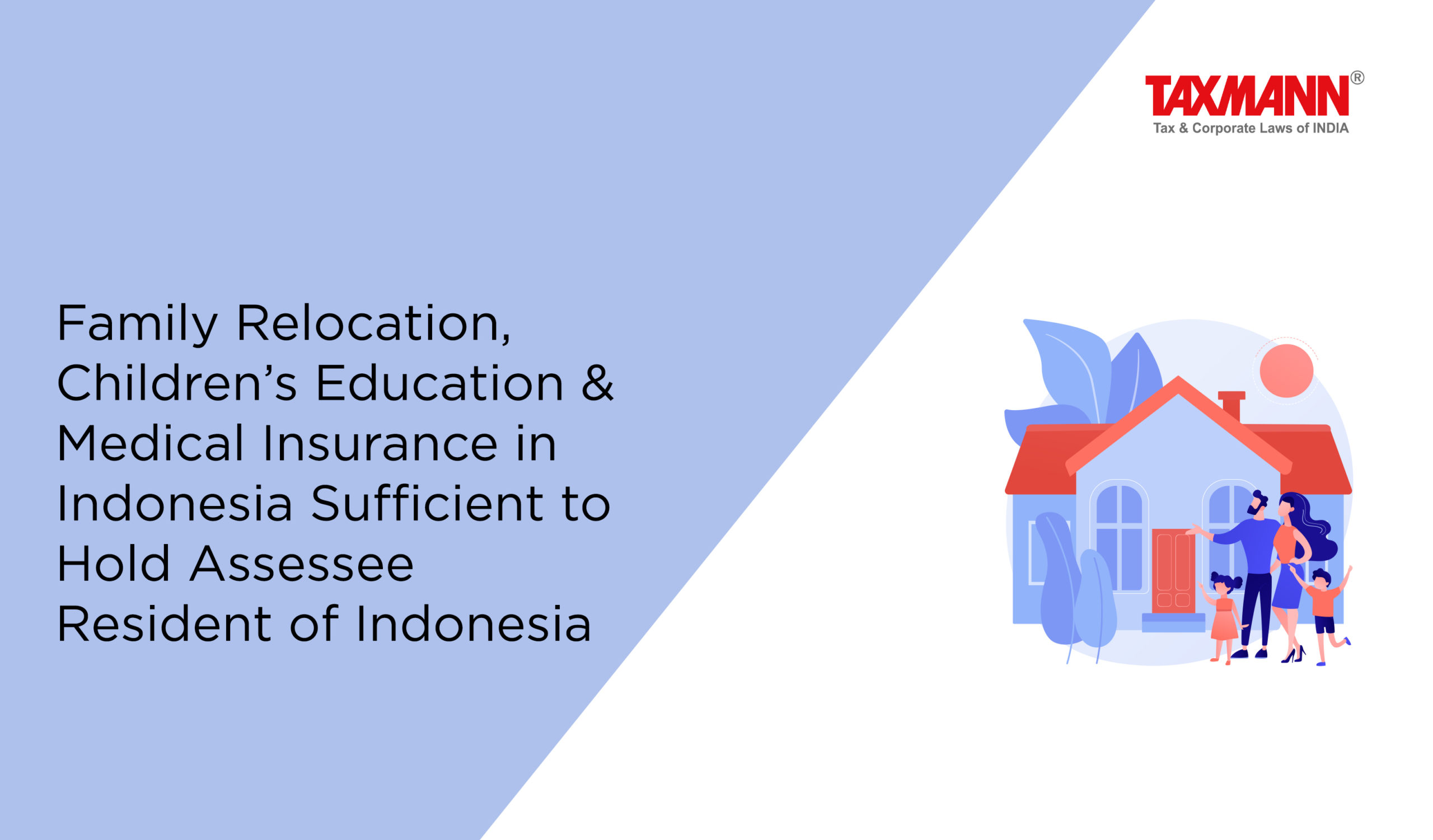Family Relocation, Children’s Education & Medical Insurance in Indonesia Sufficient to Hold Assessee Resident of Indonesia
- Blog|News|International Tax|
- 3 Min Read
- By Taxmann
- |
- Last Updated on 4 August, 2023

Case Details: Narinder Pal Singh v. ACIT - [2023] 152 taxmann.com 356 (Delhi-Trib.)
Judiciary and Counsel Details
-
- N. K. Billaiya, Accountant Member & Anubhav Sharma, Judicial Member
- Ms. Priti Goel, AR for the Appellant.
- Sanjay Kumar, Sr. DR for the Respondent.
Facts of the Case
Assessee-individual was employed with an Indian entity. During the year under consideration, the assessee was sent on a long-term assignment to Indonesia and worked wholly and exclusively for the Indonesian entity. He was considered a Resident and Ordinarily Resident in India as per the domestic tax laws of India and continued to receive his salary through India payroll by credit to his bank account in India for administrative convenience.
As the payroll of the assessee continued in India, the Indian entity deducted and deposited the taxes section 192 and issued a Form 16. The assessee filed his return of income in India and claimed that he qualified as a Resident of Indonesia as per the domestic tax laws of Indonesia. Thus, the salary for overseas assignment duration for the period January to March of the relevant year was not taxable in India.
However, the Assessing Officer (AO) rejected assessee’s contention. On appeal, the CIT(A) confirmed the AO’s order, and the matter reached Delhi Tribunal.
ITAT Held
The Tribunal held that the issue for discussion was whether for determining the residential status as per article 4 of the relevant DTAA, the ‘permanent home available’ is mere availability of residential property or the phrase ‘permanent home available’ has a wider connotation.
It can be noted that Article 4(2)(a) of the DTAA pertains to determining the tax residency of a resident in one of the contracting States. This article states that if the resident has a permanent home available, his tax residency will be attributed to that contracting State. In this case, other factors become inconsequential in determining their tax residency.
The tax authorities have fallen in error in giving a literal interpretation to the words ‘permanent home available’ referred to in Article 4 of the relevant DTAA, which certainly is not a permanent house as understood by the Tax authorities. Owning a residential unit and having a permanent home available are two patently different things for determining the tax residency status.
While the former is just the existence of the right to property. It is the owner holding a legal title and his physical relation to the object and to the rest of the world. The latter indicates the real intention to possess the property (animus possidendi). It implies the intention to appropriate to oneself the exclusive use and enjoyment of the house.
CIT(A) proceeded on this premises alone that the assessee was not a person having a permanent home available to him in Indonesia as he has occupied leased premises provided by a local employer there. Therefore, as per article 4(2)(a) the assessee has to be assumed to be a person without a permanent home.
In the instant case, the evidence on record about the assignment of a job in Indonesia, shifting of the family by the assessee to Indonesia, children getting an education in Indonesia, submitting income earned from the foreign assignment for taxable purposes in Indonesia, and having economic communication based on holding a bank account and insurance in Indonesia are sufficient to show that the habitual abode of the assessee is at Indonesia.
Thus, the Tax Authorities wrongly interpreted the concept of ‘permanent home available’. The findings of the Tax Authorities below regarding taxing the assessee’s income earned from foreign assignment were liable to be reversed.
List of Cases Reviewed
-
- Sameer Malhotra v. ACIT [2023] 146 taxmann.com 158/199 ITD 317 (Delhi – Trib.) (para 16) followed.
List of Cases Referred to
-
- Sameer Malhotra v. ACIT [2023] 146 taxmann.com 158/199 ITD 317 (Delhi – Trib.) (para 16).
Disclaimer: The content/information published on the website is only for general information of the user and shall not be construed as legal advice. While the Taxmann has exercised reasonable efforts to ensure the veracity of information/content published, Taxmann shall be under no liability in any manner whatsoever for incorrect information, if any.

Taxmann Publications has a dedicated in-house Research & Editorial Team. This team consists of a team of Chartered Accountants, Company Secretaries, and Lawyers. This team works under the guidance and supervision of editor-in-chief Mr Rakesh Bhargava.
The Research and Editorial Team is responsible for developing reliable and accurate content for the readers. The team follows the six-sigma approach to achieve the benchmark of zero error in its publications and research platforms. The team ensures that the following publication guidelines are thoroughly followed while developing the content:
- The statutory material is obtained only from the authorized and reliable sources
- All the latest developments in the judicial and legislative fields are covered
- Prepare the analytical write-ups on current, controversial, and important issues to help the readers to understand the concept and its implications
- Every content published by Taxmann is complete, accurate and lucid
- All evidence-based statements are supported with proper reference to Section, Circular No., Notification No. or citations
- The golden rules of grammar, style and consistency are thoroughly followed
- Font and size that’s easy to read and remain consistent across all imprint and digital publications are applied



 CA | CS | CMA
CA | CS | CMA
